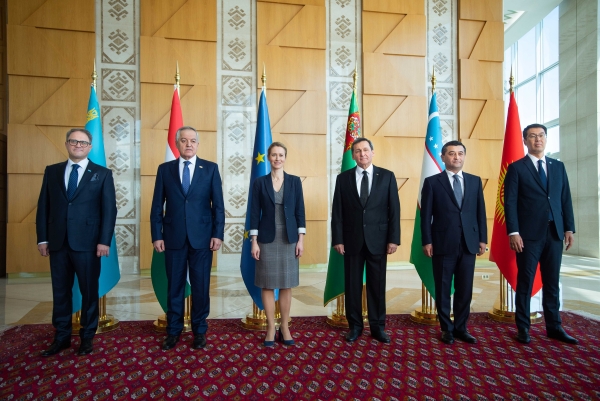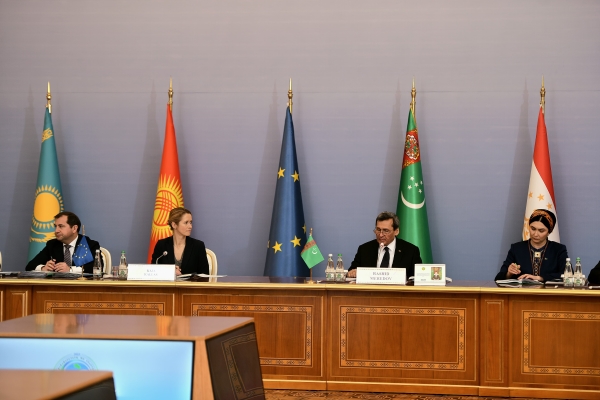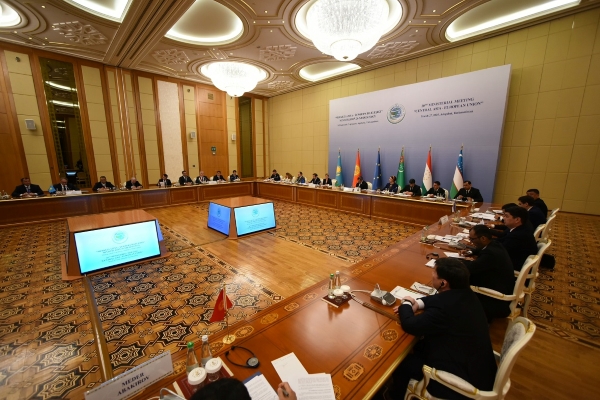The European Union and the five Central Asian countries reaffirmed their strong political commitment to strengthening engagement and deepening cooperation during the 20th EU-Central Asia Ministerial meeting, chaired by the EU High Representative for Foreign Affairs and Security Policy, Kaja Kallas, on 27 March 2025 in Ashgabat, Turkmenistan. The Foreign Ministers of Tajikistan, Turkmenistan and Uzbekistan as well as the Deputy Foreign Ministers of Kazakhstan and Kyrgyzstan participated.
A joint communiqué is available here.
The Ministerial meeting was an opportunity to assess the implementation of the five key areas of the EU-Central Asia Roadmap for Deepening Ties between the EU and Central Asia, endorsed in October 2023.
The EU and Central Asian Ministers discussed openly issues of mutual strategic interest, including cooperation under the EU’s Global Gateway Flagship Initiatives in Central Asia in areas such as trade, transport, water resource management, energy, climate change, digitalisation and critical raw materials. Both sides committed to advancing cooperation on people-to-people contacts, including on education, vocational training, research and skills development.
Participants reaffirmed the EU’s and Central Asian countries’ determination to uphold the United Nations Charter and the fundamental principles of international law, particularly the respect for the independence, sovereignty and territorial integrity of all States. Both sides stressed the urgency of reaching a comprehensive, just and lasting peace in Ukraine, in line with the principles of the Charter of the United Nations, and committed to continuing close cooperation on addressing sanctions circumvention.
The importance of deeper cooperation in addressing common security challenges, including the fight against organised crime, violent extremism, radicalisation, and regional security concerns such as developments in Afghanistan were also discussed.
Preparations for the first ever EU-Central Asia Summit, on 4 April 2025 in Samarkand, Uzbekistan were also discussed. The Summit will confirm the political resolve for closer strategic cooperation between the two regions at the highest political level. During her visit, HR/VP Kallas met with President Serdar Berdimuhamedov and held discussions focusing on strengthening cooperation in areas such as energy, connectivity, sustainable development, and education. She also addressed the regional security situation, emphasizing the importance of defending international law and the territorial integrity of countries while advocating for solutions through dialogue and negotiations. In his turn, President Berdimuhamedov confirmed his participation in the upcoming European Union–Central Asia Summit. Additionally, HR/VP Kallas met with Foreign Minister Rashid Meredov to summarize the discussions at the Ministerial meeting, explore future cooperation, and advance preparations for the Samarkand Summit.
Background
In 2019, the EU adopted a Strategy on Central Asia(Kazakhstan, Kyrgyzstan, Tajikistan, Turkmenistan, Uzbekistan), which highlights the growing strategic relevance of the region.
Since 2019, cooperation between the EU and Central Asia has further advanced in many areas and serves as an example of a partnership for resilience, prosperity and sustainability. New initiatives, including the EU’sGlobal Gateway and the EU Green Deal, provide a framework for the green and digital transitions while increasing trade, investment and connectivity. Bilateral relations were also developed and Enhanced Partner and Cooperation Agreements were concluded. In October 2023, the EU and Central Asia adopted a Joint Roadmap for Deepening Ties between the EU and Central Asia that sets out five key areas to enhance overall EU-Central Asia relations through dialogue and practical cooperation. This Roadmap further demonstrates the commitment of the EU and Central Asia to strengthen cooperation in areas of mutual benefit. ///EU Delegation to Turkmenistan


